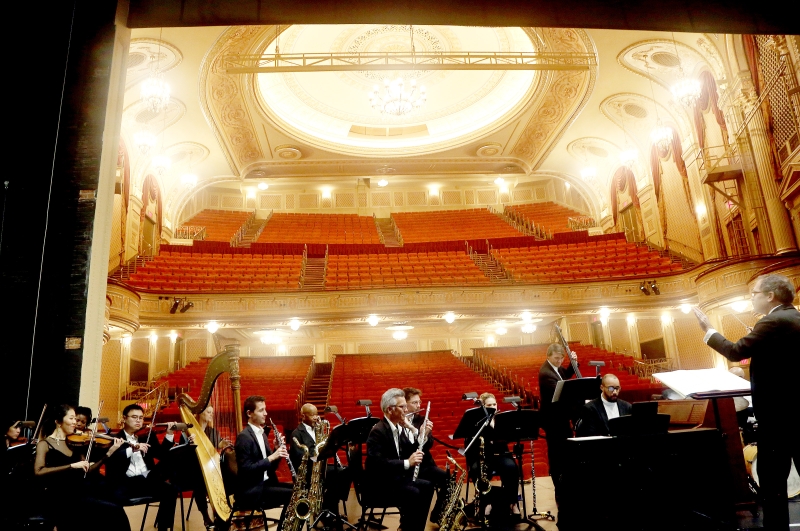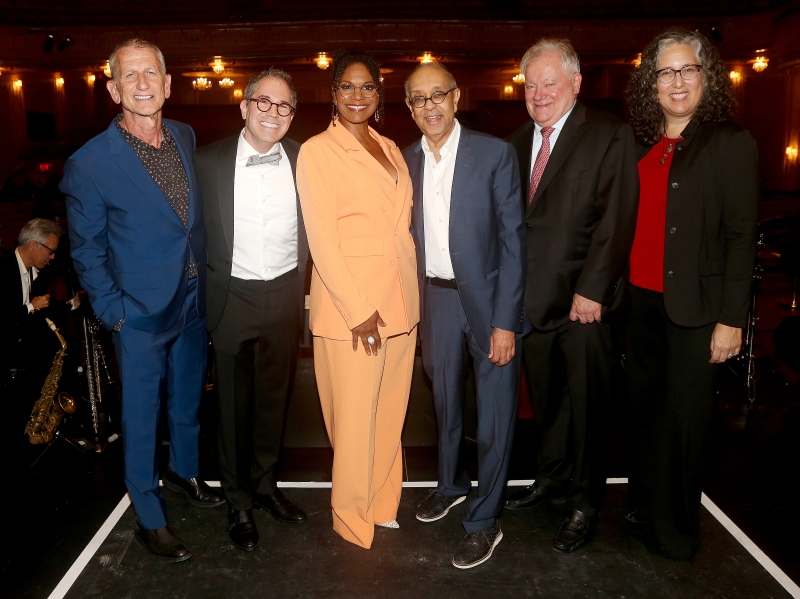In just a mattter of months, Gypsy, one of the most beloved musicals of all time, returns to Broadway in its fifth revival. The show has previously starred some of the greatest performers of all time (Ethel Merman, Angela Lansbury, Tyne Daly, Bernadette Peters, and Patti LuPone - just to name a few) in what is considered one of the greatest roles in the musical theatre canon- Mama Rose.
This time, it's Audra McDonald's turn, and she's leading an all new prroduction that will be brought to life by visionary director, George C. Wolfe.
One of the most exciting updates to expect from this revival will be the inclusion of a fully restored score- a project that is being helmed by Musical Supervisor, Director and Conductor Andy Einhorn. He checked in with BroadwayWorld to tell us all about the work he and his colleagues are doing to create a Gypsy that hasn't been heard since 1959.
What a big week for you to get to reopen the Majestic!
It sounds hyperbolic, but it was truly perfect to get the chance to reopen this beautifully restored theater, which has been brought back to its original beauty and splendor. But as George C. Wolfe said, and Audra alluded, we're in the shadows and the great company of all of those artist who have stood before us in that building and on that stage and there's a safety net that comes with that, which is beautiful and then combined with the fact that we were getting our full orchestra of 26 players, which is remarkable for today.
Wow, 26!
Yes, but also, and featuring a restored orchestration- we will be going back to the original version that Sid Ramin and Robert Ginzler both orchestrated for the original production. And part of the journey of getting to that point was that this show has obviously been revived countless times over the years since the original production. Even after the original production, the show went on the road and that was at a time where, let's say, your woodwind player wasn't quite as strong in Decatur, Illinois, as the original players on Broadway. So what starts to happen is the orchestration began to be tweaked a bit and slightly adjusted from what the original intent was.
When we were exploring this production with all of the players involved from George to Audra to Camille, all signs pointed in the direction of why not explore this?
And what exactly goes into that restoration process?
I have a friend who has been working at Encores for almost about 20 years as sort a sort of music historian/restoration-type person. His name is Josh Clayton. I called Josh because I had some questions about why certain instrument doublings were such as they were. And over the course of that conversation, I said, 'Why has nobody ever found the original parts?' And he said, 'Well, I'll raise you and say, what if we were to actually consider rescoring the original orchestration?' So, the two of us and Jason Buell are working with the Jule Styne estate.
Right now we are deep in the weeds of doing what everyone heard earlier this week, but the overture and all the way to the end of the show, which is a big undertaking for a short amount of time, but it will really make a big difference.
I mean, the proof is there... that overture sounded incredible.
There was just such a clarity to the sound. And also, that was just an acoustic version. Nothing was amplified!

I can't wait to hear the rest!
It's like an architectural dig. It's very nerdy, but it's very music historian based, but it's really combing through. The amount of material that there is is actually rather surprising because you're not only conferring from sort of the orchestrators handwritten notes, but then you're looking at pit parts from the original Broadway production. And, then you're looking at pit parts from the tours and then you're comparing that against recorded versions of the show.
Even on the original cast album, there are different introductions from songs that were not then ever used in the show. So, we're comparing that and saying, well, do we wanna restore that? Do we wanna consider using that? Ultimately what it means is that you're trying to get back to the truest version of the show.
So, essentially what people will hear in this revival hasn't been heard since the original 1959 production?
Correct. I've had the great fortune of working on tremendous revivals in my life, but Gypsy is the classic American musical in a lot of ways. It really surprised me that this didn't exist. I keep joking with people that we're doing a mitzvah for the American musical theater right now.
There's something wonderful about having to get inside the brain of somebody. Just as George is getting inside of the brain of these writers, and even in Jerome Robbins and trying to understand how this was put together, I think that for us as living artists, there's something that's so satisfying to sometimes have to jump into that mindset and wonder why specific choices were made.
And now to hear this restored sound coupled with Audra McDonald singing it...
She's our greatest living, singing actor of our time. What she's gonna bring to the role is something that nobody's ever seen before. When you look at somebody like George and you combine his work with her work, there's an electricity that comes with that. And then you match that with the size and the scope of this piece. And as she has said, and as everybody will say, this is really the King Lear of musical theater roles. I can't think of another role in musical theater where musically, textually, character, it really requires a full 360 degree performance.

A lot of people consider Gypsy the greatest musical ever written. Why do you think it holds up?
Just as Fiddler on the Roof is about tradition and family, I think we all can connect to the idea of realizing our dreams. And within realizing our dreams, those obstacles that are around us and those obstacles that are within us. And I think there's something about these characters that has them always reaching for something greater than they have at any moment. And this is a strange word to describe any of them because it doesn't necessarily seem intuitive, but there is a humility at moments against a backdrop of a maniacal thirst and hunger. I think the best musicals are the ones where we see something of baseline human emotion that anybody in that audience can relate to.
And then couple that with the fact that I think truly it has one of the most sensational scores ever written. I think these songs are truly timeless. Jule Styne was a master. And the fact that combined with Sondheim for the wit and the beauty of lyric and just sort of that perfect marriage of word and music with again, I think Arthur's book is flawless. It is a beautifully told story and the it tells a in a very profound way.
And now a whole new genration of thearegoers will get to experience it.
I guarantee that there will be people in this audience who have never seen the show before. Isn't it exciting to know that we are creating a revival for those who love the show, and for those who have never seen the show before. If we do our job correctly, then we will make everybody in that audience feel that they know it and love it and that in some ways it feels like it was just written today.
Photo Credit: Bruce Glikas